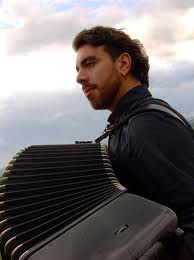 Claudio Jacomucci graduated in accordion from the Conservatoire Nationale de Grenoble in 1992. He studied accordion with Jean Luc Manca, Vladimir Zubitsky and Mogens Ellegaard. From 1997 to 2000 he also gratuated as a teacher of the Alexander Technique from ATCA in Amsterdam. He studied Southern Indian Classical Music and won several international competitions, collaborated and played with internationally renowed musicians and composers such as Berio, Donatoni, Kurtag, De Pablo, Porena. He is the author of the book “Tecnica I” published by Bèrben, and “Mastering Accordion Technqieu” written together with Kathleen Delaney on the principles of the Alexander Technique. He’s accordion teacher at the Conservatory of Pescara (Italy) and the director of the Italian Accordion Academy in Urbino.
Claudio Jacomucci graduated in accordion from the Conservatoire Nationale de Grenoble in 1992. He studied accordion with Jean Luc Manca, Vladimir Zubitsky and Mogens Ellegaard. From 1997 to 2000 he also gratuated as a teacher of the Alexander Technique from ATCA in Amsterdam. He studied Southern Indian Classical Music and won several international competitions, collaborated and played with internationally renowed musicians and composers such as Berio, Donatoni, Kurtag, De Pablo, Porena. He is the author of the book “Tecnica I” published by Bèrben, and “Mastering Accordion Technqieu” written together with Kathleen Delaney on the principles of the Alexander Technique. He’s accordion teacher at the Conservatory of Pescara (Italy) and the director of the Italian Accordion Academy in Urbino.
How did you start and how it has evolved the technique of the instrument? How is changed its image in Western culture?
When I started playing in the early 80s, teaching accordion was in its infancy. I studied with a very old-fashioned methodology, pedagogically very poor and absolutely not adapted to the times. I speak about Italian and French school of the ’50s (absurdly still in use today). Afterwards, I had to make a real catharsis, before studying the technique of Eastern European and Scandinavian schools, up to publish a book of notes, exercises, fingering reasoned button accordion (Technique I, Berben 1998), then – after I trained as a teacher of the Alexander Technique – a technique I developed innovative accordion, in which the skill and dexterity grow hand in hand with the psycho-physical understanding and musical experience.
Today, there are various currents, “schools” very advanced, just think of the Serbian school, to the Basque, Finnish, Danish, German, Polish and French. Finally in Italy is emerging a new school. Almost all European schools have developed a alternative technique to the former Soviet Union prevailing for decades, because of changed aesthetics, repertoire, instruments, and then came the need for a range of sounds richer and more articulate.
Play the accordion. What does it mean today?
From the professional point of view, the fields in which there is a future for the accordion are certainly contemporary classical music, all the folk revival and jazz. Then there are the commercial trends. This is what ‘s on the house. Play the accordion, however, is something else. Every musician has an artistic identity and hence its uniqueness creating new “prospects”. So it was for all the great accordionists, pioneers of a style, and so true visionaries will continue to be.
Today, the accordion is out of its niche, its small world, is now an adult, excellent performers, musicians of excellence that spread its modern culture on a wider scene.
What are your experiences in teaching?
I began teaching accordion in 1993, at the beginning it was difficult. I did not understand why many guys have so many problems in learning, and many psycho-physical limits since an early age and because instead, to others everything comes naturally and easily.
Here too, the Alexander Technique, which is a very practical method, I was a big aid, to understand how we function, both at the physical, physiological and mental and psychological.
For about fifteen years I have experienced the application of the Alexander Technique on teaching and accordion technique. For some years now, I realize an educational project and a performance called “Accordion Academy” which is basically an education, a professional internship in which you prepare and carry the concert , where students collaborate with other musicians, dancers, choreographers and composers and everyone realizes their work with the peculiar quality of this technique.
I also teach at the Conservatory “L. D’Annunzio ” in Pescara and hold master classes in various academies (Royal Academy of London, Helsinki Sibelius Academy, the Conservatoire Superieur de Musique et Danse Paris, the Royal Danish Academy Copenhagen, Cracow Academy , etc.).
Your career and your interests reflect a great versatility of your instrument. Can you talk about how you handle the various experiences in the field of entertainment, composition, concerts etc.?
The projects that I make are the result of a search, driven by curiosity and interest in music, art, composition. Somehow you have to realize the imagination to be made with a tool, an instrument or multiple instruments. And here is a challenge: to reconcile a new idea with the identity of the instrument. Not always is successful. A few years ago I transcribed several of Flamenco songs and composed music on rhythmic structures of this music. I did not want to resign, but eventually I threw everything and I abandoned the project!
I define my instrument as “classical accordion”. Is not a term that refers to a style of music, much less to Mozart and Haydn. It is the most advanced instrument of the family and its range is huge regardless of the genre (which by the way is not even defined). Surely I love any kind of music that exploit its full potential and that meet my interest and my aesthetic.
So it may be that I devote years to the study of Baroque music (at the bottom of the classical accordion is a successor of the old keyboard instruments), which devote myself to revisit and rewrite the music of traditional origin (indelible popular imagination). But the field in which I think there is more creativity is that of contemporary music, no longer confined to the school of Darmstadt and the currents of the ’60s and ’70s that have alienated the public by creating a barrier with the complexities of music and mental theoretical.
Today’s music is full of influences and projects where the accordion is the protagonist are many, thanks to the pioneers, the investigators of the past.
The hardest thing is to always find the right channel on the concert scene to offer their projects. It can change from project to project and the possibilities are numerous. We must be able to attract the interest “accordion” and captivate with the sounds and with content.
From classical to jazz, ethno-jazz and electronic. What is the difference? Is more technical or cultural?
Obviously cultural. As I said, the genders are not as defined. All styles have influenced, mixed, generating others. So the technique: you can not talk about technique disconnected from the musical context. Each language has its own style or technique.
The problem with many accordionists is the lack of creativity. The jazz accordionists (with minor exceptions) is a folk with a few flowering swing. The electronics are the electronic accordion to play maybe the varieté (virtuoso entertainment music of little interest). The contemporary – classical music is to some accordionist and composer who writes music as in the nineteenth century. We are completely out of touch current music.
You can not play starting with a score whatsoever. The musicians have interests and spend years and years studying and research. The accordionists playing the same things, have little curiosity, idolize the figures of the past, samples, Paganini, the Segovia accordion, so their emancipation is what it is.
There are so many talented accordionists, some great musicians, a few artists. Rare are those who possess all three of these qualities.
Can you tell us briefly of the book “Mastering accordion technique”? I have seen that include presentations in important contexts, such as Copenhagen and Helsinki.
Thanks to the principles of the Alexander Technique and experience in its application to the teaching of the accordion, Kathleen Delaney and I had clarity on the fundamental issues of technical accordion, from the point of view of anatomy, physiology, ergonomics, in fact most scientific of personal insights which are usually proposed.
The first part of the book deals with the various problems of the technique: the ergonomic qualities of the different instruments, the same setting (such as ” wear “, how to sit and how to support it). We designed a model of very functional ergonomic straps. Then, specifically, the production of sound, the techniques of the bellows, the digital technique, the criteria for fingering, without neglecting the issues related to learning, such as “learning to learn”, “hear and listen”, “time and metronome”, “develop technical skills”, “how to learn a new song”, “phrasing and breathing”, “interpretation”, “imitation”, “scenic panic”. The second part of the book instead illustrating the origins and principles of the Alexander Technique, procedures and applications; adds elements of anatomy, physiology, proprioception and some thoughts on education child health of the musician and diseases related to the musical activity and common physical problems of accordionists.
The book, for the moment, is only available in English.
Questo post è disponibile anche in: Italian

 English
English Italiano
Italiano 





Leave a comment
You must be logged in to post a comment.